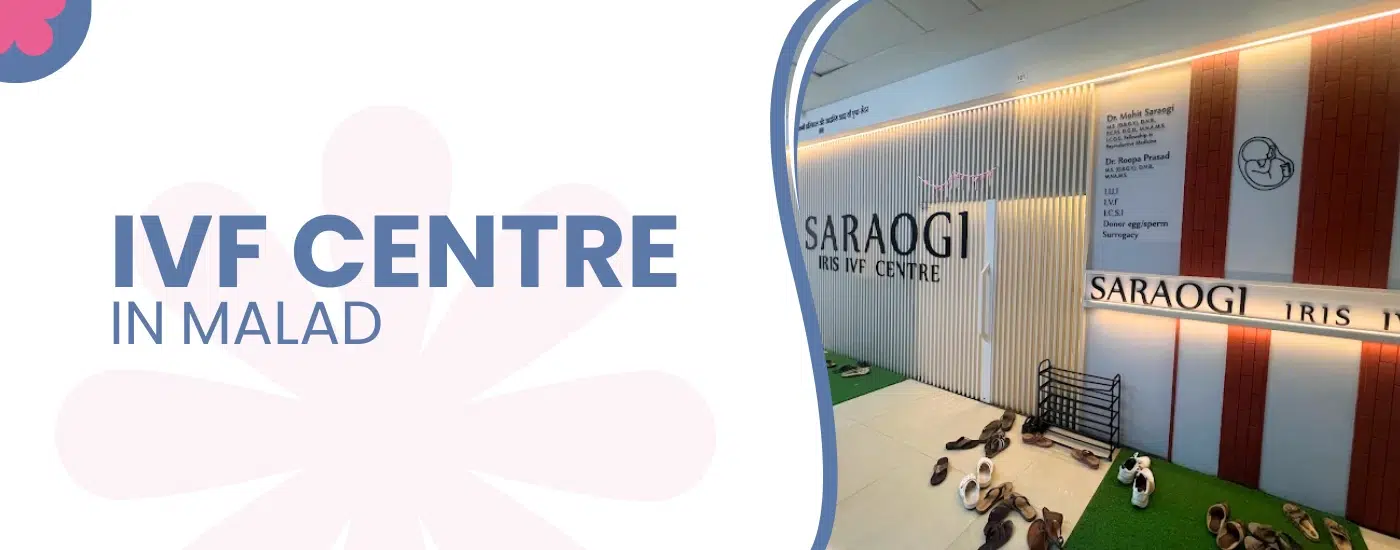
Address
Khetan Apartment, Malad (W, Swami Vivekananda Rd, opp. Telephone Exchange, Mumbai, Maharashtra 400064
IVF Centre in Malad
Infertility is a challenge faced by millions worldwide, affecting around 15% of couples who are unable to conceive naturally. In India, the issue is equally widespread, with approximately 27.5 million couples struggling with infertility. While this can be an emotionally and physically draining journey, advancements in medical science have made remarkable strides in helping individuals and couples achieve their dream of parenthood.
According to Dr. Mohit Saraogi at Saraogi Hospital, a well-known IVF Centre in Malad:
“IVF, or In Vitro Fertilization, is one of the most successful treatments for those who are unable to conceive naturally. It allows us to offer patients the highest chance of conception, even in the most challenging cases of infertility. The importance of a tailored approach in fertility treatments cannot be overstated, as every individual’s journey is unique.”
Are you struggling with infertility and unsure about your next steps? It might be time to consult a seasoned IVF doctor in Mumbai who can guide you on the path to parenthood.
IVF and New Advancements in IVF Procedures
IVF is commonly used for various fertility issues, including blocked fallopian tubes, ovulation disorders, male infertility, or unexplained infertility.
Dr. Mohit Saraogi, an accomplished IVF Doctor in Mumbai, explains:
“IVF involves retrieving eggs from the ovaries and fertilizing them with sperm in a laboratory. Once the embryos develop, one or more are transferred to the uterus to initiate pregnancy. IVF offers a high chance of success, particularly when combined with advanced fertility techniques.”
Some of the latest advancements in IVF procedures include:

Time-Lapse Imaging:
This technology allows embryologists to monitor embryo development closely, increasing the chances of selecting the healthiest embryos for transfer.
Preimplantation Genetic Testing (PGT):
PGT enables screening for genetic abnormalities in embryos, ensuring only healthy ones are selected, which enhances the success rate.

Cryopreservation of Eggs and Embryos:
With advancements in freezing techniques, eggs and embryos can be stored more efficiently, providing more flexibility in treatment timelines.
Ovarian Tissue Cryopreservation
This technique involves freezing ovarian tissue for future use, offering hope for women facing fertility loss due to medical treatments like chemotherapy. It preserves fertility by allowing ovarian tissue to be re-implanted when the patient is ready to conceive.
Assisted Hatching:
This technique helps the embryo implant more effectively in the uterus by making a small opening in the embryo’s outer layer.
IVM (In Vitro Maturation):
In cases where traditional IVF may not be suitable, IVM allows immature eggs to be harvested and matured in the lab, offering an alternative option.
ICSI (Intracytoplasmic Sperm Injection)
ICSI is a highly precise technique where a single sperm is directly injected into an egg to facilitate fertilization. It is beneficial in cases of male infertility and has enhanced success rates for IVF treatments.

IMSI (Intracytoplasmic morphologically selected sperm injection)
IMSI is an improved version of ICSI which employs a microscope to evaluate sperm under extreme magnification to choose the best sperm.
NIPT (Non-Invasive Prenatal Testing)
NIPT is a method for detecting genetic abnormalities in embryos without invasive procedures. Analyzing a sample of the mother’s blood helps identify chromosomal disorders early in the pregnancy, ensuring healthier outcomes.
Ovarian Rejuvenation Techniques
For women with diminished ovarian function, ovarian rejuvenation techniques, such as platelet-rich plasma (PRP) therapy, can help revive ovarian activity, increasing the chances of retrieving viable eggs for IVF.
Sequential Embryo Transfer
This method involves transferring embryos at different stages of development, improving the likelihood of successful implantation and pregnancy. It provides flexibility in treatment and often increases pregnancy rates.
MRT (Mitochondrial Replacement Therapy)
MRT is a revolutionary technique to prevent mitochondrial diseases by replacing damaged mitochondria in the mother’s egg with healthy ones from a donor. It allows women with certain genetic conditions to have healthy children.
Artificial Intelligence (AI) and Machine Learning
AI and machine learning are now being applied in embryo selection, helping to analyze vast data sets to predict the best embryos for transfer. This technology enhances decision-making and optimizes IVF outcomes.
Stem-Cell Therapy
Stem-cell therapy can potentially treat infertility by regenerating ovarian tissue or even developing new eggs. Though still in experimental stages, this technique holds great promise for future fertility treatments.
Importance of Consulting an IVF Doctor
Consulting an IVF doctor is crucial for couples who are struggling to conceive naturally. Fertility specialists offer personalized treatment plans tailored to individual needs, increasing the chances of a successful pregnancy. With the complexities involved in reproductive health, it’s essential to work with a doctor who can accurately diagnose the root causes of infertility and recommend the most appropriate treatments.
A consultation with a highly-experienced IVF doctor can also provide clarity, addressing concerns and explaining all available options. Whether it’s age-related infertility, hormonal imbalances, or male infertility factors, an knowledgeable IVF specialist ensures that no aspect is overlooked in your journey toward parenthood.
Wondering if IVF is the right step for you? Speak with a dedicated IVF doctor in Mumbai to explore your options and receive expert guidance.
Why Choose Saraogi Hospital?
Saraogi Hospital stands out as a prominent fertility clinic in Mumbai for several reasons:
Comprehensive Care: Saraogi Hospital provides a full range of fertility services, from initial consultations to advanced fertility treatments, ensuring every step of your journey is covered.
State-of-the-Art Facilities: With modern labs and cutting-edge equipment, the hospital is equipped to offer the latest in IVF technology and treatments.
Experienced Specialists: The hospital is home to some of the best IVF doctors in Mumbai, with years of experience and a proven track record of successful pregnancies.
Personalized Treatment Plans: Each patient receives a tailored treatment plan considering their unique medical history and fertility challenges.
Supportive Environment: The compassionate and dedicated staff at Saraogi Hospital offer emotional and psychological support throughout the treatment process, making the journey to parenthood smoother and less stressful.
Success Rates: With advanced techniques, compassionate care, and a highly skilled team, Saraogi Hospital has emerged as one of the best IVF Centres in Mumbai. They have consistently helped individuals and couples from all walks of life realize their dream of becoming parents, making them a trusted name in the field of reproductive medicine.
Ready to take the next step toward your dream of starting a family?
How to contact us?
Scheduling an appointment with an IVF doctor at Saraogi Hospital is simple and hassle-free. With multiple branches across Mumbai, you can choose the most convenient location. You can call us, email us, or fill in your details and book a consultation with ease.
Incorporating the latest advancements in reproductive medicine, compassionate care, and cutting-edge technology, Saraogi Hospital remains a trusted choice for IVF treatment. Whether you’re just starting your fertility journey or looking for specialized care, Saraogi Hospital is here to help.

Ready to start your fertility journey? Book your appointment and receive personalized care tailored to your needs!
The following are common concerns that can help you feel confident and informed about your fertility treatment options.
Frequently Asked Questions
How long does an IVF cycle typically take?
An IVF cycle typically takes around 4 to 6 weeks from the start of medication to the embryo transfer. The exact timeline can vary depending on individual responses to treatment and the IVF protocol used.
Are there any risks associated with IVF?
While IVF is generally safe, there are some risks, such as ovarian hyperstimulation syndrome (OHSS) or multiple pregnancies. Your IVF doctor will monitor you closely to minimize these risks and ensure a safe treatment process.
Can IVF help with male infertility?
Yes, IVF can assist in cases of male infertility, especially when combined with techniques like Intracytoplasmic Sperm Injection (ICSI), where a single sperm is injected directly into an egg to aid fertilization
Is IVF painful?
IVF involves some discomfort, particularly during egg retrieval, but it is generally well-tolerated. Any pain or discomfort is usually temporary, and your doctor will take steps to ensure your comfort throughout the procedure.
How successful is IVF on the first attempt?
Success rates for IVF vary depending on factors like age, underlying fertility issues, and the quality of the embryos. On average, the success rate for women under 35 is around 40% to 50%. Your doctor will discuss your chances based on your specific situation.

